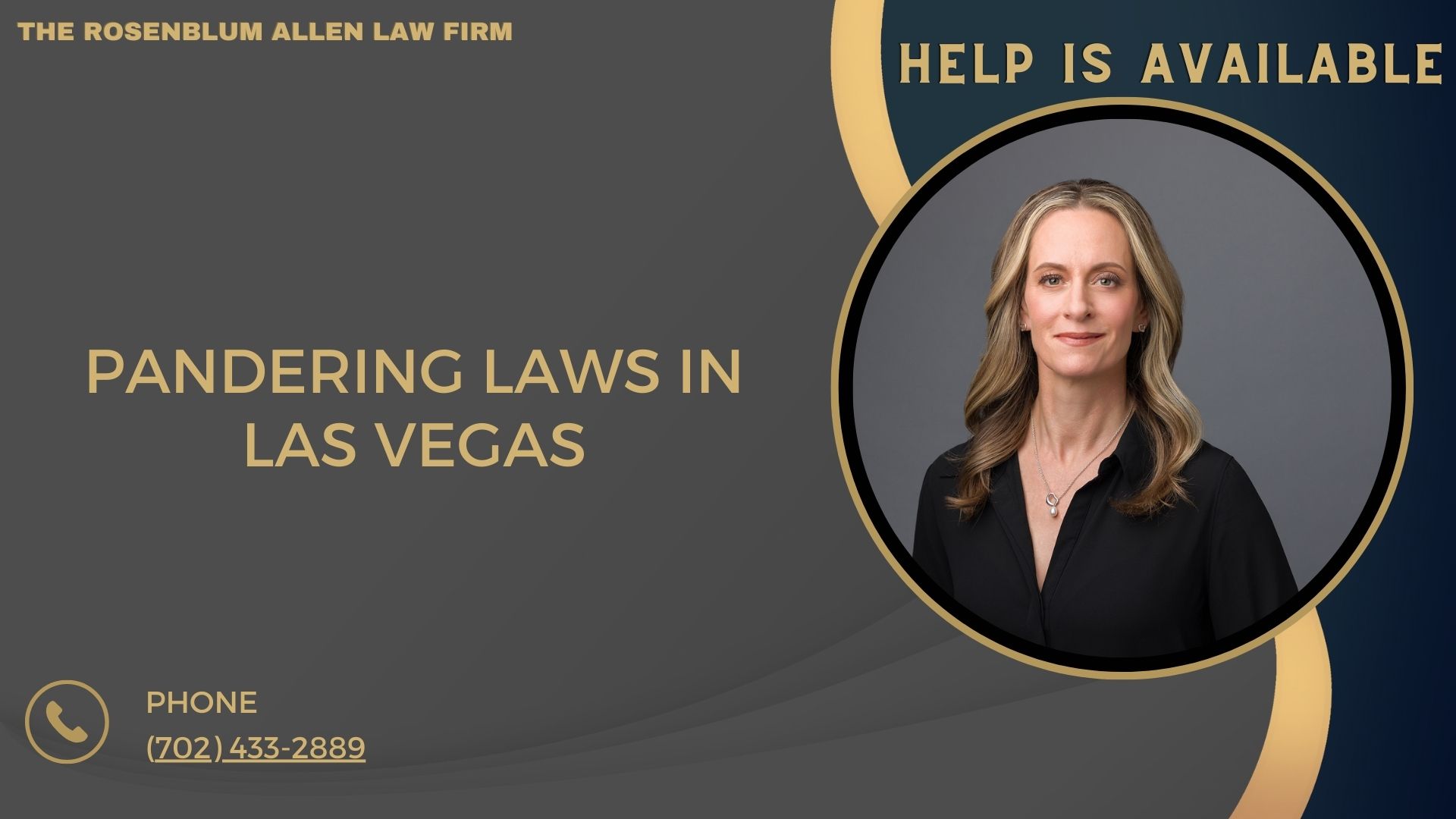Common Examples of Pandering
Several scenarios can constitute pandering under Nevada law:- Coercion: Threatening someone with harm or withholding essential support to force them into prostitution.
- Fraudulent Promises: Offering financial incentives or false assurances, such as job opportunities, to recruit individuals into prostitution.
- Management or Facilitation: Running an illegal operation where others engage in prostitution, even without direct coercion.
- Pandering Minors: Convincing or forcing individuals under 18 to participate in prostitution. This is treated with significantly harsher penalties.
Pandering Laws in Nevada
Nevada Revised Statutes on Pandering
Pandering is explicitly addressed in Nevada Revised Statutes (NRS) 201.300. According to the law, pandering involves any act of inducing, enticing, or compelling another person to engage in prostitution, with or without their consent. The statute also criminalizes using threats, promises, or fraud to influence someone’s decision. The critical elements of the statute include:| Element | Description |
|---|---|
| Inducement or Coercion | Actions taken to recruit someone into prostitution, either willingly or by force. |
| Intent to Exploit | Demonstrable intent to profit or gain from another person’s participation. |
| Involvement of Minors | Special provisions that increase penalties for pandering minors. |
Federal vs. State Laws on Pandering
While Nevada’s laws specifically address pandering within the state, federal laws can apply in cases involving interstate activity or organized trafficking.| Aspect | Nevada Law | Federal Law |
|---|---|---|
| Scope | Limited to actions within Nevada borders | Includes interstate and international activity. |
| Penalty Focus | State-defined prison terms and fines | Broader penalties, including life imprisonment for trafficking. |
| Applicable Cases | Localized operations | Cross-state or large-scale exploitation. |
Criminal Classification and Sentencing
Pandering is considered a serious offense in Nevada, often classified as a felony. The level of severity depends on the specific circumstances of the case. Here’s a breakdown of potential penalties:| Type of Pandering | Classification | Typical Penalty |
|---|---|---|
| Involving adults without coercion | Category C felony | 1–5 years in prison, up to $10,000 fine |
| Using force, threats, or fraud | Category B felony | 2–10 years in prison, higher fines |
| Involving a minor | Category B felony | 3–20 years in prison, mandatory fines |
Aggravating Factors That Increase Penalties
Certain factors can lead to harsher penalties, including:- Coercion or Force: Using threats, violence, or manipulation to control another person.
- Exploitation of Vulnerable Individuals: Targeting minors, undocumented immigrants, or those in financial distress.
- Repeat Offenses: A history of similar convictions may lead to enhanced sentencing.
- Organized Criminal Activity: Participation in a more extensive trafficking or prostitution ring.
Collateral Consequences of Pandering Convictions
The effects of a pandering conviction extend beyond the courtroom. Here are some potential long-term consequences:- Employment Challenges: A felony record can make finding or retaining jobs difficult.
- Housing Difficulties: Many landlords run background checks and may refuse to rent to convicted felons.
- Social Stigma: A conviction for pandering can damage personal relationships and community standing.
- Sex Offender Registration: If the case involves minors, registration as a sex offender is mandatory, which comes with further restrictions.

Legal Defenses to Pandering Charges
Common Defenses Used in Pandering Cases
Facing pandering charges can be overwhelming, but several legal defenses may apply:- Lack of Intent: Proving that there was no intention to coerce or induce someone into prostitution.
- Consent of the Participant: Arguing that the alleged victim willingly engaged without influence or pressure.
- False Accusations: Highlighting motives for false reporting, such as revenge or misunderstandings.
- Mistaken Identity: Demonstrating that the accused was not the individual involved in the crime.
Evidentiary Challenges
Evidence plays a crucial role in pandering cases but can sometimes be unreliable. Possible issues include:- Witness Credibility: The testimony of individuals involved in prostitution may be scrutinized for reliability.
- Improper Police Conduct: Violations of search and seizure laws can lead to excluding evidence.
- Lack of Corroboration: More evidence linking the accused to the crime would weaken the prosecution’s case.
Role of Legal Representation
The proper legal representation can make all the difference. Experienced attorneys can:- Challenge the prosecution’s evidence.
- Negotiate plea deals to reduce charges or penalties.
- Advocate for dismissal of charges when legal errors are identified.
Pandering vs. Prostitution
Pandering and prostitution are often confused, but they are distinct crimes under Nevada law. Prostitution refers to the act of engaging in sexual activities for payment. Pandering, on the other hand, involves influencing or forcing someone else to engage in prostitution. Key differences include:| Aspect | Prostitution | Pandering |
|---|---|---|
| Who is charged? | The individual engaging in the act of prostitution | The person coercing, inducing, or facilitating the act |
| Legal focus | The exchange of sex for money | The exploitation or manipulation of another person |
| Penalties | Typically misdemeanors or gross misdemeanors | Felonies with harsher punishments |
Pandering vs. Prostitution
Pandering and prostitution are often confused, but they are distinct crimes under Nevada law. Prostitution refers to the act of engaging in sexual activities for payment. Pandering, on the other hand, involves influencing or forcing someone else to engage in prostitution. Key differences include: AspectProstitutionPandering Who is charged? The individual engaging in the act of prostitution The person coercing, inducing, or facilitating the act. Legal focus: The exchange of sex for money The exploitation or manipulation of another person Penalties Typically misdemeanors or gross misdemeanors Felonies with harsher punishments Pandering carries much steeper penalties because it targets exploitation, especially of vulnerable individuals. Human trafficking and pandering overlap in some areas, but they are not identical. Trafficking is broader and includes the transportation, harboring, or selling of people for forced labor or sexual exploitation. Pandering focuses specifically on influencing or forcing someone into prostitution. Comparison:| Aspect | Human Trafficking | Pandering |
|---|---|---|
| Scope | Involves various forms of exploitation, not just sex | Specific to influencing others to engage in prostitution |
| Penalties | Federal and state laws apply, harsher penalties | Felony charges, but not as severe as trafficking |
| International Component | Often includes cross-border activity | Primarily local or state-based actions |

Preventing Pandering in Las Vegas
Efforts by Law Enforcement
Law enforcement in Las Vegas takes a proactive stance in preventing pandering and related crimes. Several initiatives are in place to reduce exploitation and keep individuals safe.- Operation Deter: This is a local effort to crack down on prostitution and pandering through targeted undercover operations.
- Human Trafficking Task Force: A multi-agency initiative that includes the Las Vegas Metropolitan Police, federal agencies, and non-profits to address human trafficking, a crime that often overlaps with pandering.
- Specialized Training: Officers receive training to recognize the signs of trafficking and pandering, ensuring they can identify and assist victims early.
Public Awareness Campaigns
Public awareness is crucial to preventing pandering. By educating the public about the signs of exploitation, communities can become more vigilant and proactive in reporting suspicious activities.- Know the Signs: Campaigns like “Look Beneath the Surface” educate the public about common signs of human trafficking and pandering.
- Community Outreach: Local organizations and law enforcement host community forums to educate residents on how to spot and report suspected exploitation.
- Youth Programs: Schools and community centers often partner with non-profits to raise awareness about the dangers of exploitation and how to avoid becoming a victim.
- The more the community understands pandering, the less likely individuals will fall prey to it, and the more likely perpetrators will be caught.

Breaking It All Down
Understanding pandering in Las Vegas is essential for both residents and visitors. Nevada law takes pandering seriously, with severe penalties and a strong focus on protecting vulnerable individuals. Whether you’re facing charges or want to learn how to prevent this crime, knowing the ins and outs of pandering can help you navigate the legal landscape.
This guide covers everything you need to know, from understanding what constitutes pandering to exploring potential defenses. Legal consequences can be harsh, but those accused or victimized by pandering can seek justice with the proper support and resources.
If you or someone you know is involved in a pandering case, it’s crucial to consult with an experienced attorney to understand your rights and options. Taking prompt action can make a significant difference in the case outcome.

Frequently Asked Questions
What is the difference between pandering and trafficking?
Pandering and trafficking are related but distinct crimes. Pandering involves inducing or coercing someone into prostitution, while human trafficking involves the illegal movement or exploitation of people for various purposes, including prostitution. Trafficking typically refers to larger, more organized criminal operations and may involve multiple forms of exploitation beyond prostitution.
Can someone be charged with pandering if the person being coerced is not forced into prostitution?
Yes, even if the individual coerced into prostitution eventually agrees to participate, the person who induced or facilitated the act can still be charged with pandering. The law focuses on the act of coercion, manipulation, or exploitation, not necessarily the victim’s final decision.
What should I do if I suspect someone is being coerced into prostitution?
If you suspect someone is a victim of pandering or trafficking, it’s crucial to act quickly. You can contact local law enforcement or the National Human Trafficking Hotline at 1-888-373-7888. If you’re unsure, it’s always better to report any concerns. Trained professionals can assess the situation and take appropriate action.
How can I protect my loved ones from becoming victims of pandering?
Raising awareness is one of the best ways to protect your loved ones. Talk openly about the dangers of exploitation, encourage healthy relationships, and educate them on how to identify coercive behaviors. Support networks, such as friends, family, and community groups, are also essential in providing guidance and ensuring safety.
What are the chances of getting a reduced sentence for pandering?
The chances of getting a reduced sentence depend on various factors, including the case’s specifics, whether any mitigating circumstances exist, and whether the defendant has any prior criminal history. A skilled attorney can negotiate a plea deal or present evidence that could lead to reduced penalties.
Are there any legal alternatives to prison for those convicted of pandering?
In some cases, individuals convicted of pandering may be eligible for alternative sentencing options such as probation, rehabilitation programs, or community service, particularly if they have no prior offenses. The court’s decision will depend on the nature of the offense and the defendant’s history.
Can a pandering conviction be expunged from my record?
In Nevada, it is possible to have certain criminal records sealed, including pandering convictions, under specific circumstances. However, this process is complex and typically requires an attorney’s assistance. Convictions involving minors or particularly severe cases may be subject to different rules regarding expungement.
What is the role of a defense attorney in a pandering case?
A defense attorney plays a crucial role in challenging the prosecution’s evidence, identifying any weaknesses in the case, and developing a strategy to reduce or dismiss the charges. They will investigate the facts, examine witness testimony, and ensure that the defendant’s legal rights are protected throughout the legal process.
Can pandering charges be brought against a business or organization?
Yes, businesses or individuals who facilitate or profit from prostitution may be charged with pandering. This could include owners of establishments such as brothels, strip clubs, or any operation that profits from or facilitates the act of prostitution. In such cases, the organization or business could face legal consequences besides the individual charged.
What are the long-term effects of a pandering conviction?
A pandering conviction can have lasting effects on many aspects of life. In addition to prison time and fines, individuals may struggle with finding employment, housing, and maintaining personal relationships. A criminal record may limit access to certain rights and opportunities, such as voting or traveling internationally.

Additional Resources for You
Our esteemed lead attorney, Molly Rosenblum, Esq., has not only demonstrated exceptional legal expertise in the courtroom but has also dedicated significant effort to create a suite of comprehensive resources. These resources are tailored to assist and educate you during challenging times, especially if you are navigating the complexities of the legal system in relation to sex crime allegations and defenses. Here’s a guide to the valuable resources available to you:
Sex Crimes Attorney: Find specialized legal support and guidance for those accused of sex crimes, ensuring a robust defense and understanding of your rights. Learn more.
Date Rape Defense Attorney: Access expert defense strategies and legal insights if you’re facing allegations of date rape, securing the representation you need for such sensitive cases. Learn more.
Las Vegas Sex Offender Registration Violation Attorney: Navigate the complexities of sex offender registration laws in Las Vegas and seek legal assistance if you’re facing violations. Learn more.
Child Pornography Charges: Understand the serious nature of child pornography charges and explore your legal options to defend against such allegations. Learn more.
Sexual Assault Charges: Gain insights into the legal nuances of sexual assault charges and find experienced legal counsel to navigate these serious allegations. Learn more.
Indecent Exposure: Learn about the legal implications of indecent exposure charges and how to effectively approach your defense. Learn more.
Sex Trafficking Charges: Understand the grave nature of sex trafficking charges and access specialized legal support to address such allegations. Learn more.
Age of Consent in Las Vegas: Familiarize yourself with the laws regarding the age of consent in Las Vegas, an essential aspect for anyone navigating the local legal landscape. Learn more.
Las Vegas Solicitation Criminal Law: Delve into the specifics of solicitation laws in Las Vegas and find expert legal advice to handle accusations or charges. Learn more.
Spousal Rape Nevada: Understand the complexities of spousal rape laws in Nevada and secure the necessary legal expertise to navigate such sensitive and serious accusations. Learn more.
These resources have been meticulously developed to provide clarity and support, ensuring that you’re well-informed and confidently prepared to handle the legal challenges you may face.
Why You Haven't Already Hired a Defense Attorney to Help You
Watch this short video to take the next big step toward defending your rights against your felony charge.

A Special Message from Our Lead Attorney

Dear Reader,
I appreciate you taking the time to review our resources. They have clarified how our team at The Rosenblum Allen Law Firm can assist you, particularly in handling pandering defense cases.
Each case carries its unique circumstances and complexities.
It’s essential to have a clear, tailor-made strategy for your situation.
That’s why we invite you to schedule a free consultation with us. It would be our pleasure to sit down with you, discuss your case in detail, and help you understand your legal options.
Please feel free to reach out at any time at (702) 433-2889.
Our team is ready and eager to listen, understand, and provide you with the guidance you need during this challenging time.
Thank you once more for considering The Rosenblum Allen Law Firm.
We look forward to the possibility of working together to help you navigate through this legal journey.
Best Wishes,
Molly
The Rosenblum Allen Law Firm




